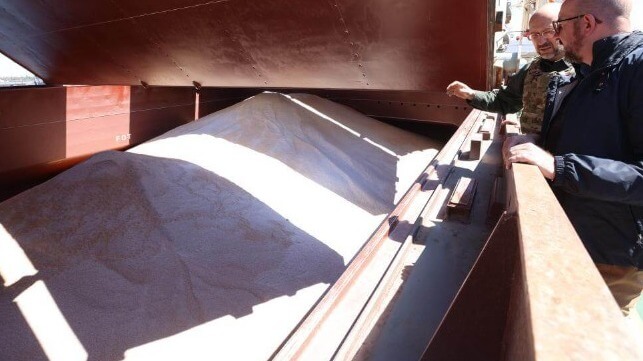World Leaders Expect Black Sea Grain Deal to be Renewed

The presidents of Russia, Turkey and France have all expressed new optimism that the Black Sea Grain Initiative for Ukrainian grain shipping will be renewed this coming weekend. The breakthrough deal took effect in early August, but it is time-limited, and Russia had threatened to end its participation if its demands about its own export volumes were not met.
On Tuesday, Turkish President Recep Tayyip Erdogan told a press conference at the G20 conference in Indonesia that "as of now I am of the opinion that [the grain initiative] will continue." He added that he had received positive signals from Russian President Vladimir Putin, who is not attending.
At a press conference Tuesday, French President Emmanuel Macron echoed Erdogan's confidence. "The scheme in place since last August will be able to continue" under a "tacit" renewal, he suggested.
Russia temporarily suspended its participation in the corridor once in late October, shortly after Ukraine attacked the Russian Black Sea Fleet at Sevastopol with drone boats. Grain shipping operations continued on and off without Russian involvement - setting a new daily record - and facing intense diplomatic pressure, Russia soon rejoined the agreement.
For months, Russia has complained that it is not getting enough out of the deal because foreign buyers are not purchasing enough of its fertilizer and grain cargoes, and it has blamed Western sanctions for the low level of interest. The U.S. and EU have sanctions carve-outs for Russian grain, but the UN officials charged with implementing the agreement say that the challenge is in educating private-sector actors: it takes time to explain that Western firms can still do business in this specific trade when so many other transactions with Russia are banned.
On Tuesday, EU foreign policy chief Josep Borrell took a moment to remind reporters why the northwestern Black Sea needs an international grain initiative at all: to prevent a Russian naval blockade on Ukrainian seaports.
"[The safety corridor] is not because a natural disaster, it is not because of a tsunami in the Black Sea, it is not because there were pirates. It is because the blockade of the Russian Army [Navy] to the exports of Ukraine - using hunger as a weapon," he said. "Russia has no reasons, no legal ground to block food [from] going out from Ukraine to the international markets."
